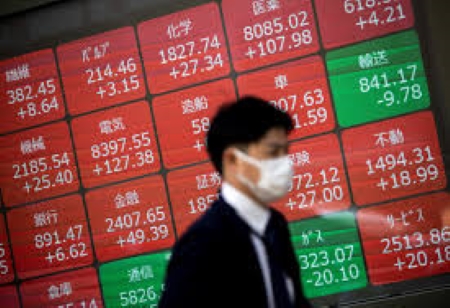
On Wednesday, Asian equities extended their winning streak to reach their highest levels in seven months, led by South Korean stocks, while the Australian dollar hit multi-month highs as rising inflation made higher interest rates more likely.
MSCI's broadest index of Asia-Pacific shares outside Japan rose 0.4% to a seven-month high, with South Korean shares up 1.3% as trading resumed following the Lunar New Year holidays.
The MSCI index has gained 9% so far this year after falling nearly 20% in 2022. Because the Chinese and Taiwanese markets were closed for the holidays, trading volume was low.
The Nikkei gained 0.1%, while Singapore gained 1.7%.
Globally, stocks have rebounded strongly this year after a disastrous 2022, on expectations that inflation is nearing a peak and that the rise in US interest rates will slow. The removal of COVID controls in China, as well as the reopening of its borders, has boosted investor confidence even more.
"It appears that markets are increasingly seduced by "Goldilocks" outcomes of tightening risks being tamed while recession risks are being tempered," Mizuho analysts wrote in a note.
U.S. stock indexes finished mixed on Tuesday after companies warned of a difficult year ahead, despite some profit beats, and data showed U.S. business activity contracted for the seventh consecutive month in January.
Microsoft Corp rose in after-hours trading as its better-than-expected results demonstrated some resilience in the face of adversity.
On Tuesday, MSCI's all-country world index set a new five-month closing high.
Stronger-than-expected economic data in Europe has alleviated market concerns about a severe recession in the eurozone as energy prices fall, though interest rates are still expected to rise.
The euro held near a nine-month high against the dollar, as traders were encouraged by a brighter growth outlook for the eurozone versus signs of a US recession.
On Wednesday, Australian equity markets fell 0.2% after a surprise rise in inflation to a 33-year high last quarter strengthened the case for the Reserve Bank of Australia to keep raising interest rates.
Investors have sharply reduced their expectations that the Reserve Bank of Australia (RBA) will raise its cash rate by a quarter point to 3.35 percent when it meets on February 7. Analysts thought the RBA might even pause its tightening campaign, but the rate of inflation put an end to that.
The Kiwi, on the other hand, fell nearly 0.4 percent to $0.648 after New Zealand's annual inflation rate of 7.2 percent in the fourth quarter fell short of the central bank's forecast of 7.5 percent.
Crude oil prices in the United States remained stable at $80 per barrel after falling the previous session as preliminary data indicated a larger-than-expected build in US oil inventories.
Gold prices remained stable at $1,938 per ounce, close to a nine-month high reached the previous session.